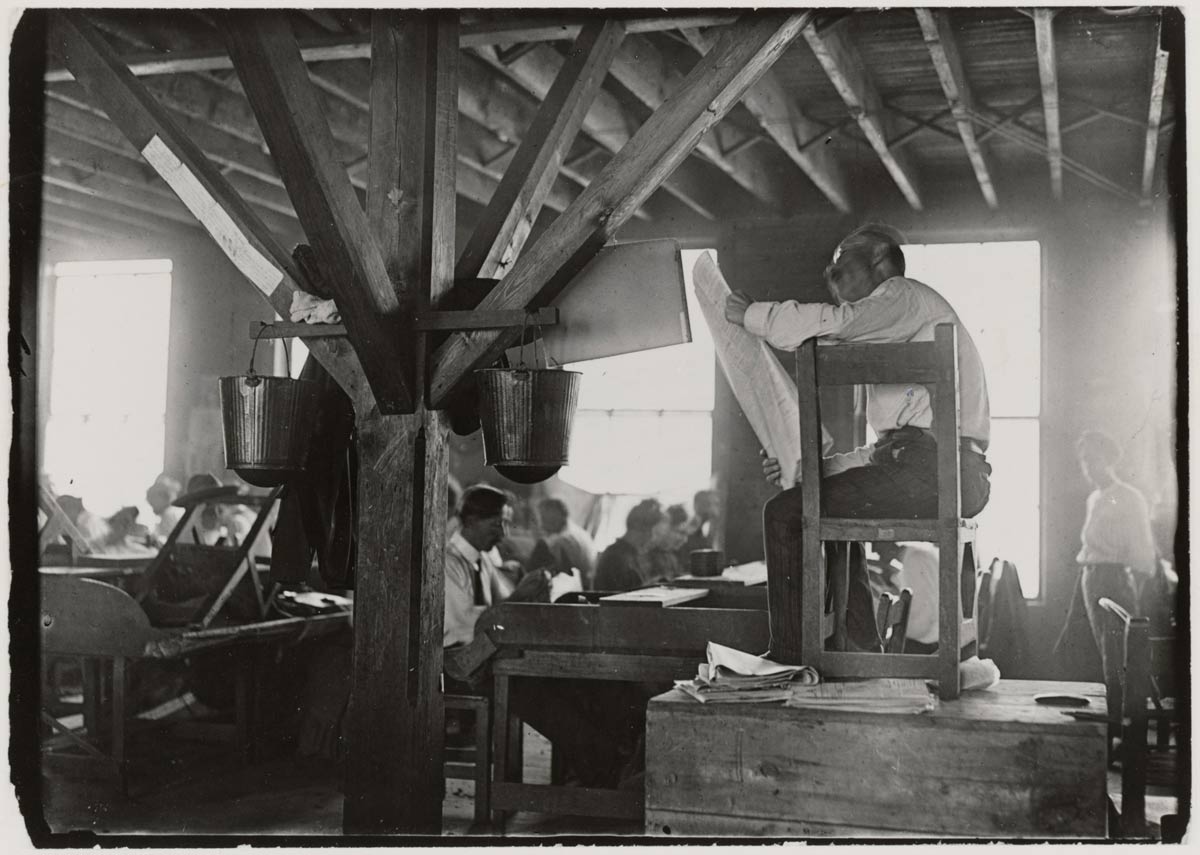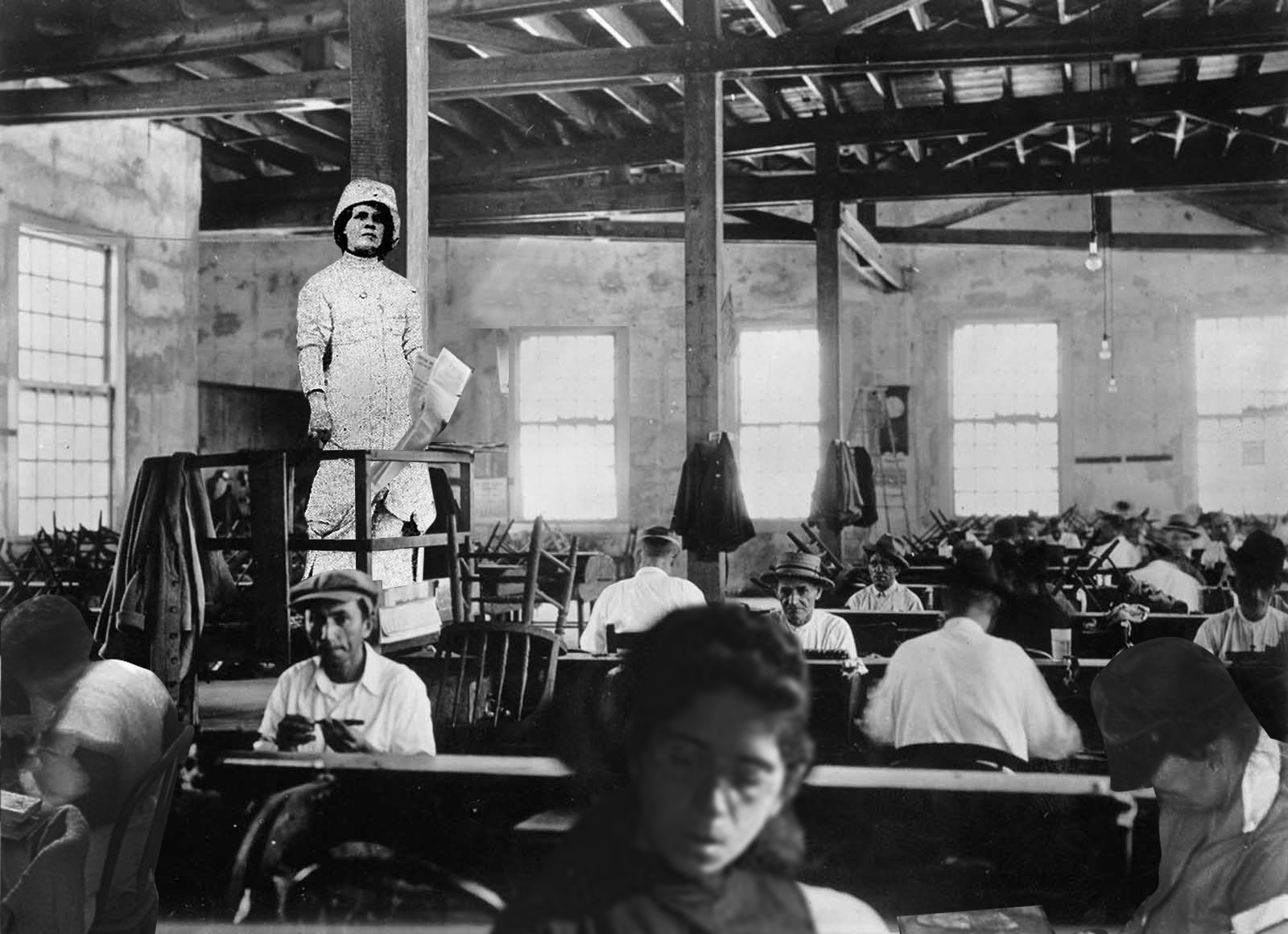LOUDREADERS
A Brief Introduction
Left: Loudreader reads from the newspaper
Below: Luisa Capetillo Loudreads in a tobacco factory
![]()

About LOUDREADERS
LOUDREADERS is a platform of public vocational education of architecture, urbanism, and related fields. Loudreaders produces, designs, and supports a public literacy of the built and destroyed environment by means of online and physical exhibitions, publications, lectures, symposia, workshops, events, installations and spaces.
Since its foundation in 2020, LOUDREADERS has provided over 70 lectures and workshops and has produced several publications and exhibitions both digital and physical (available on the main page).
Publications include the free edition of ‘A Manual of Anti-Racist Architecture Education’ and ‘Un Manual de Educacion Antirracista en Arquitectura’, both accessible here. To order the publications go here.
To participate or collaborate with LOUDREADERS please write to contact@loudreaders.com.
To enroll in the summer sessions of LOUDREADERS including workshops, talks, and discussions apply here.
The full Calendar of upcoming events are here.
Online recordings of the lectures and detailed workshops with supporting material can be found numbered on loudreaders.com main page.
LOUDREADERS is committed to creating a program that is accessible and free.
LOUDREADERS is a registered 501c3 Non-Profit supported by The Mellon Foundation and re:arc institute. LOUDREADERS is also fiscally sponsored by The Producer Hub via The Tank. To support LOUDREADERS go here.
LOUDREADERS is a platform of public vocational education of architecture, urbanism, and related fields. Loudreaders produces, designs, and supports a public literacy of the built and destroyed environment by means of online and physical exhibitions, publications, lectures, symposia, workshops, events, installations and spaces.
Since its foundation in 2020, LOUDREADERS has provided over 70 lectures and workshops and has produced several publications and exhibitions both digital and physical (available on the main page).
Publications include the free edition of ‘A Manual of Anti-Racist Architecture Education’ and ‘Un Manual de Educacion Antirracista en Arquitectura’, both accessible here. To order the publications go here.
To participate or collaborate with LOUDREADERS please write to contact@loudreaders.com.
To enroll in the summer sessions of LOUDREADERS including workshops, talks, and discussions apply here.
The full Calendar of upcoming events are here.
Online recordings of the lectures and detailed workshops with supporting material can be found numbered on loudreaders.com main page.
LOUDREADERS is committed to creating a program that is accessible and free.
LOUDREADERS is a registered 501c3 Non-Profit supported by The Mellon Foundation and re:arc institute. LOUDREADERS is also fiscally sponsored by The Producer Hub via The Tank. To support LOUDREADERS go here.
Background
Loudreaders borrows its name from an alternative practice of education in the turn of the 19th and beginning of the 20th Century created as tobacco workers engaging in the monotonous labor of rolling cigars hired one of their own who knew how to read, to read for them during the entire work-day. As the practice of loud-reading grew, the lectores (loud-readers) will become traveling performers with an international audience, creating networks of solidarity all around the Caribbean, as well as a massive, shared, and open access oral library to workers who were denied any other means of formal education.
As the practice of the loudreading shifted from classics of ‘Western’ literature to philosophy and literature that shared an emancipatory, decolonial, and anti-capitalist imagination by organizers like feminist, anarcho-syndicalist and utopian author Luisa Capetillo, new networks of solidarity were forged among workers as they sought collective liberation.
Since spatial practices take numerous forms that shape and reshape the Caribbean, LOUDREADERS trade school considers the broad influence and possibilities of architecture and related fields in understanding the histories of the region while fomenting the construction of critical visions of the future.
Through the study of the ways in which emancipatory spatial practices are forged in the Caribbean, and around the world, LOUDREADERS asks how can these models of spatial and land thinking help generate alternatives to the ways in which we engage with urgent planetary questions.
LOUDREADERS becomes a planetary laboratory for emancipatory imaginaries forged in the Caribbean, as the brutality of extraction and exploitation that was the blueprint of the plantation (and its economies) has spilled on the rest of the world like organic matter.
In the way that the Caribbean has historically been the testbed for the conditions of a warming world where the conditions of the tropics cannot be contained by imaginary boundaries, LOUDREADERS proposes a laboratory to think collectively about the future of social and ecological justice, reparations, repatriations, and reconstructions. Considering the Caribbean’s geopolitical, linguistic, historical pluriversality, LOUDREADERS operates as an itinerant institution that fosters the free exchange of critical spatial knowledge through networks of intellectual solidarity.
LOUDREADERS ethos is that ‘other worlds are possible.’
Loudreaders borrows its name from an alternative practice of education in the turn of the 19th and beginning of the 20th Century created as tobacco workers engaging in the monotonous labor of rolling cigars hired one of their own who knew how to read, to read for them during the entire work-day. As the practice of loud-reading grew, the lectores (loud-readers) will become traveling performers with an international audience, creating networks of solidarity all around the Caribbean, as well as a massive, shared, and open access oral library to workers who were denied any other means of formal education.
As the practice of the loudreading shifted from classics of ‘Western’ literature to philosophy and literature that shared an emancipatory, decolonial, and anti-capitalist imagination by organizers like feminist, anarcho-syndicalist and utopian author Luisa Capetillo, new networks of solidarity were forged among workers as they sought collective liberation.
Since spatial practices take numerous forms that shape and reshape the Caribbean, LOUDREADERS trade school considers the broad influence and possibilities of architecture and related fields in understanding the histories of the region while fomenting the construction of critical visions of the future.
Through the study of the ways in which emancipatory spatial practices are forged in the Caribbean, and around the world, LOUDREADERS asks how can these models of spatial and land thinking help generate alternatives to the ways in which we engage with urgent planetary questions.
LOUDREADERS becomes a planetary laboratory for emancipatory imaginaries forged in the Caribbean, as the brutality of extraction and exploitation that was the blueprint of the plantation (and its economies) has spilled on the rest of the world like organic matter.
In the way that the Caribbean has historically been the testbed for the conditions of a warming world where the conditions of the tropics cannot be contained by imaginary boundaries, LOUDREADERS proposes a laboratory to think collectively about the future of social and ecological justice, reparations, repatriations, and reconstructions. Considering the Caribbean’s geopolitical, linguistic, historical pluriversality, LOUDREADERS operates as an itinerant institution that fosters the free exchange of critical spatial knowledge through networks of intellectual solidarity.
LOUDREADERS ethos is that ‘other worlds are possible.’
Luisa Capetillo: LOUDREADER
Luisa Capetillo (b. 1879, Arecibo) was a worker, writer, labor organizer, and Loudreader. In a time when Loudreading was mostly performed by men, Capetillo—who had been arrested in La Habana for wearing a shirt, tie, pants, and short brim hat—offers a model for contemporary forms of Loudreading. In Puerto Rico, Tampa, and New York, Capetillo will Loudread texts by Kropotkin, Bakunin, Malatesta, while serving as a syndicalist representative for the workers and creating and distributing emancipatory propaganda.
In 1909 she publishes La Mujer (Women), and the following year publishes La Humanidad en el futuro (Humanity in the Future), a utopian tale centered around a central strike. She writes about freedom, sexual education, and the rights of men and women.
Notes Araceli Tinajero, El lector de tabaquería: historia de una tradición cubana , (Madrid: Editorial Verbum, 2007).
Luis Othoniel Rosa, The Tobacco Intergalactic School (Postnovis Branch in the Americas)’ Feb. 1st, 2019 – Feb. 1st, 2031
Luisa Capetillo (b. 1879, Arecibo) was a worker, writer, labor organizer, and Loudreader. In a time when Loudreading was mostly performed by men, Capetillo—who had been arrested in La Habana for wearing a shirt, tie, pants, and short brim hat—offers a model for contemporary forms of Loudreading. In Puerto Rico, Tampa, and New York, Capetillo will Loudread texts by Kropotkin, Bakunin, Malatesta, while serving as a syndicalist representative for the workers and creating and distributing emancipatory propaganda.
In 1909 she publishes La Mujer (Women), and the following year publishes La Humanidad en el futuro (Humanity in the Future), a utopian tale centered around a central strike. She writes about freedom, sexual education, and the rights of men and women.
Notes Araceli Tinajero, El lector de tabaquería: historia de una tradición cubana , (Madrid: Editorial Verbum, 2007).
Luis Othoniel Rosa, The Tobacco Intergalactic School (Postnovis Branch in the Americas)’ Feb. 1st, 2019 – Feb. 1st, 2031